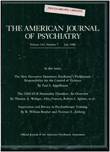Continuation drug therapy for major depressive episodes: how long should it be maintained?
Abstract
A major problem for the practitioner is the lack of satisfactory guidelines as to how long continuation drug treatment of depressive episodes must be maintained to ensure that the episode is over. This often leads to either premature withdrawal of the drug and subsequent relapse or unnecessarily prolonged treatment. Results from a collaborative project of the National Institute of Mental Health provide the first study-derived guidelines on the length of continuation therapy. Findings indicate that withdrawal of such therapy is safe only after the patient has been free of significant symptoms for 16 to 20 weeks and that focusing on mild as well as severe symptoms is critical in this decision.
Access content
To read the fulltext, please use one of the options below to sign in or purchase access.- Personal login
- Institutional Login
- Sign in via OpenAthens
- Register for access
-
Please login/register if you wish to pair your device and check access availability.
Not a subscriber?
PsychiatryOnline subscription options offer access to the DSM-5 library, books, journals, CME, and patient resources. This all-in-one virtual library provides psychiatrists and mental health professionals with key resources for diagnosis, treatment, research, and professional development.
Need more help? PsychiatryOnline Customer Service may be reached by emailing [email protected] or by calling 800-368-5777 (in the U.S.) or 703-907-7322 (outside the U.S.).



